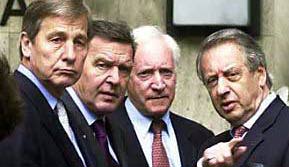February 7, 2001  Book
on Holocaust "industry" sets Germans
squirming Book
on Holocaust "industry" sets Germans
squirming
by Emma Thomasson BERLIN - U.S. academic
Norman Finkelstein
(right)
defended the publication in German of his
controversial book "The Holocaust
Industry" on Wednesday and urged the
country that spawned the Nazis not to
submit to blackmail over its
past. "It is Germany's right to reject the
use of the Nazi Holocaust as a weapon for
political and economic gain," the author
told a packed news conference in Berlin.
"The Nazi Holocaust has long ceased to be
a source of moral and historical
enlightenment. It has become a
straight-out extortion racket,"
Finkelstein said. Finkelstein, the son of two
concentration camp survivors, argues that
Jewish leaders are stoking anti-Semitism
in Europe by trying to force German and
Swiss institutions to pay new compensation
to those who suffered under the Nazis.
"The main fomentor of anti-Semitism now is
the Holocaust industry with its ruthless
and reckless extortion tactics," he said.
"The U.S. has no right to instruct Germany
in morality. Instead let the Americans
take a hard look at themselves." Compensation
DelayedThe German government and industry
agreed last year to pay 10 billion marks
($4.8 billion) compensation to about
900,000 ageing survivors the Nazis pressed
into forced and slave labour during World
War Two, provided they dropped lawsuits in
the U.S. But delays in the U.S. over
whether to dismiss class-action suits
filed by Holocaust survivors and victims'
heirs have delayed the start to
compensation payments. Faced with a raft of hostile questions,
Finkelstein said survivors should be
compensated directly and not through
bodies like the Jewish Claims Conference
or World Jewish Congress. "The German government should, on its
own, distribute the compensation monies.
It is time to close down the offices of
the Claims Conference," said Finkelstein,
who has accused the body of holding up
payments to his late mother while his
father regularly received a monthly
pension from the German government. "My
father loathed and hated every German. He
never distinguished between bad Germans
and good Germans. But he never uttered one
single complaint in the matter of
compensation."  Finkelstein,
whose book has been criticised as "full of
errors" by Germany's Jewish leader Paul
Spiegel (left,
with Schroeder and friends)
, admitted he was worried his thesis
could be exploited by neo-Nazis whose have
attracted increasing support since German
reunification. "I would be dishonest if I
did not acknowledge that I am concerned
about the enthusiastic response to my book
that may occur in right-wing circles," he
said. Finkelstein,
whose book has been criticised as "full of
errors" by Germany's Jewish leader Paul
Spiegel (left,
with Schroeder and friends)
, admitted he was worried his thesis
could be exploited by neo-Nazis whose have
attracted increasing support since German
reunification. "I would be dishonest if I
did not acknowledge that I am concerned
about the enthusiastic response to my book
that may occur in right-wing circles," he
said.
Publishers Piper Verlag have come under
heavy criticism in Germany for agreeing to
publish the book and SWR television
temporarily pulled a documentary on
Finkelstein, saying they would air the
programme on Saturday after it had been
reworked. But the author, a political scientist
at Hunter College in New York, said he
hoped his book would spark more open
debate about the Holocaust in Germany. "In
the case of Germany I think there is a
kind of political correctness on this
topic which makes difficult an open and
honest discussion on the issues that I
raise," he said. "I hope that one outcome
of the book is that it will initiate a
serious response from morally responsible
Germans and prompt a discussion in public
which currently takes place in
private." © 2001
Reuters Limited. All rights
reserved. |